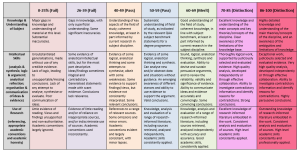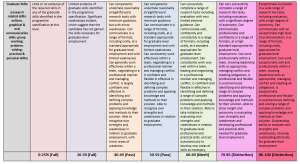- 6BM500 Business Psychology Assessment Brief 2026 | University of Derby
- MS1S463 Problem Solving for Computing Assessment Brief 2026 | USW
- HWSC5005 Applied Research in Practice Assignment Brief 2026 | OBU
- Qualifi Level 7 Unit 724 Development as a Strategic Manager Assignment Brief 2026
- A6001C17 Advances in Animal Production Science Assignment Brief 2026 | HAU
- SOCI5270 Contemporary Sociological Theory Essay Assessment 2026 | UOK
- 4BE002 The Innovative Business Assignment Brief 2026 | University of Wolverhampton
- CIPD Level 5 5LD01 Support Informal and Self-Directed Learning Assessment Brief 2026
- COM4016 Productivity and Collaboration Tools for Learning and Work Assessment Brief 2026 | Arden University
- CA6060 Financial Decision-Making in Context for Aviation Assignment 2 Question 2026
- NCFE CACHE Level 3 Diploma for Working in the Early Years Sector Assessment Brief 2026
- CRN 63466 / CRN 63467 Statutory Valuation Level 7 Assessment Brief 2026 | USM
- BSM24105 Operations and Project Management Assessment Brief 2026 | RUL
- Professional Communication Assessment 1 Semester 2, 2026 | UGM
- LAW7128 Conflict Resolution in Business Assignment Brief 2026 | BCU
- MLA604 Maritime Operations Assessment Brief Jan 2026 | MLA College
- HS7008 Research Methods in Public Health Summative Assignment 2026 | UEL
- MAR020-1 Introduction to Digital Marketing and Analytics Assignment 1 Brief 2026 | UOB
- LCBB5014 Data Handling and Business Intelligence Assignment Brief 2026 | UOW
- 6BM040 Honours Research Project Assessment Brief 2026 | University of Wolverhampton
TOWN1060 Urban Planning in the UK History Sustainable Design and Future City Development
| University | MidKent College |
| Subject | TOWN1060 The Urban Environment |
Module Learning Outcomes Covered in Assessment
- LO1: Evaluate the impact of a wide range of political, social, economic and technological factors on urban development.
- LO2: Explain the impact of urban living and urban design on human behaviour and the development of communities.
- LO3: Explain the historical development of planning systems in the United Kingdom.
- LO4: Investigate environmental issues that affect the sustainability of urban areas.
Assignment Brief and Guidance
Background
You work in a local authority planning office and you have been assigned to mentor a new employee. Additionally, your name has been put forward to be part of an industry-wide think tank on the way forward for designing cities of the future.
Do You Need Assignment of This Question
Tasks
- Research and explain the history of planning in the United Kingdom in report format to place in context for a new employee in your LA planning department.
- Research and consider urban issues from your own perspective and that of society as a whole when making recommendations for an industry wide think tank, CITT, representing the AEC (Architecture Engineering and Construction) industry with a report to the government.
- With reference to Task 1 above provide an account of how sustainable policies have gradually become adopted by governments, local authorities and designers.
- With reference to Task 2 above provide an account of problems and solutions for sustainable design in cities and rural areas, including innovative technology dealing with energy sources, phenomena such as ‘heat islands’, transport, communication, human wellbeing, eco diversity and measures to deal with rainfall, flooding and water supply, all within a range of issues connected with modern living.
Notes
This is a stand-alone assignment.
There may be contextual information in relation with other modules, such as to do with building regulations, transport, economics, politics, devolution, housing policy, affordability and current trends such as sustainability and climate change.
Indicative Content Listed in Specification
- Political, social, economic and technological factors: Historical processes: pre-industrial city, impact of industrial revolution, growth of towns and cities, impact of new transport systems, communications/technological revolutions, new building methods and materials, urban sprawl, garden cities, green belts, new towns and expanded towns, ‘world cities’ and globalisation. Urban structures: hierarchies of urban areas, classification of towns and cities, central place theory, the city region, patterns of urban land uses, ‘bid rent curves’, concentric zone, sector models of urban structure.
- Urban living and urban design: individual and the urban environment: perception, ‘mental maps’, effect of crowding, pollution, noise and stress, individual behaviour, isolation and opportunity for integration. Communities and the urban environment: concept of ‘community’, social area analysis, link between community and ‘neighbourhood’. Role of urban design; impact of design on human behaviour, development of communities, defensible space, social impact of urban renewal.
- Planning system within the United Kingdom. Emergence of modern planning system: twentieth century planning legislation, Town and Country Planning Act 1947, subsequent Town and Country Planning Act 1990, Planning and Compensation Act 1991, National Planning Policy 2012. Key elements; definition of development, development control process, types of planning permission, effect of General Permitted Development Order and Use Classes Order, Structure, Local and Unitary plans, Planning Policy Guidance notes (PPGs), Regional Planning Guidance (RPGs). Key issues in planning policy: protection of traditional centres against off-centre, edge-of-town and out-of-town developments, impact of new technology and home-working on demand for office floor space, changing relationship between home and work, distribution of future population and of new housing development, use of brownfield and Greenfield sites, protection of green belts and of environmentally sensitive areas, achievement of ‘sustainable’ development.
- Environmental issues: global issues; sustainable construction, bio-diversity, global warming, deforestation, depletion of ozone layer, acid rain, finite nature of fossil fuels. Local issues: pollution; air, water, noise, increased water extraction, contaminated land, remediation, land-fill waste; environmental assessment systems, BREEAM, impact of construction processes, flooding & heatwave
Mark Scheme (Rubric)
All tasks are marked in line with the below assessment rubric.
Internal Verification / Moderator Commentary & Signature
Moderator Commentary.
Signed: – Date: – 28/02/25
Buy Answer of This Assessment & Raise Your Grades


If you are stuck on the TOWN1060 Urban Environment assignment, then don’t worry, Engineering Assignment Helper can relieve you from worry. Our varietors are PhD qualified who have a good command over all the subjects. Here, you will find free assignment samples that can help you to determine the quality. So contact us and get your best UK assignment help service!




